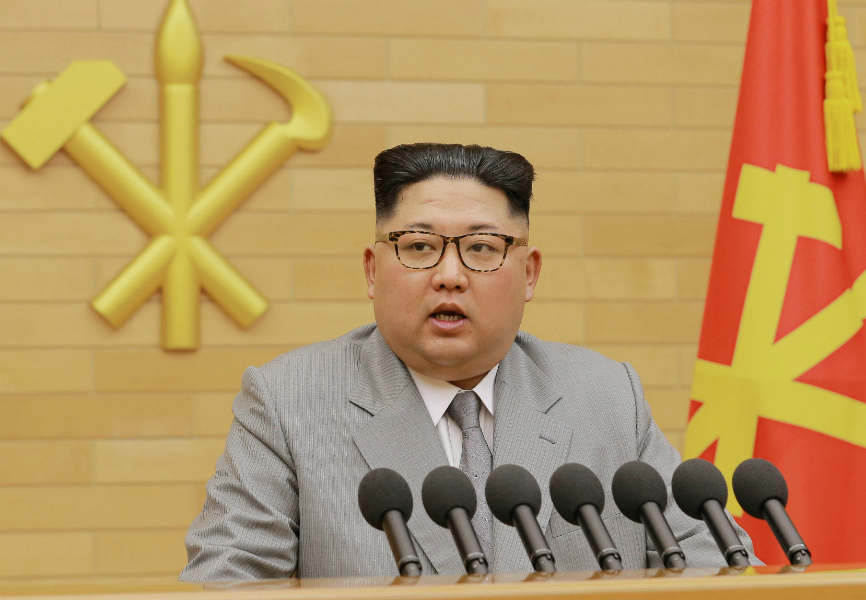Ahead of an unprecedented meeting between a sitting US president (Donald Trump) and the leader of North Korea (Kim Jong-un) that might occur in May or June, Kim and South Korean President Moon Jae-in are poised to make history at their own bilateral summit on Friday where they could push open the door to an agreement formally ending the Korean War (1950-1953). Eurasia Group Asia Director
Scott Seaman explains what to expect from the highly anticipated sit-down between these two men.
What does Kim want from the South Korean president?
More than anything else, Kim will want Moon to indicate in some way that he is willing to work to ease sanctions that the UN and individual countries, most notably the US, have imposed on North Korea. But Moon will avoid saying anything that can be interpreted as a promise to dilute the US “maximum pressure” strategy until North Korea takes very concrete steps toward denuclearization. Moon and Kim will probably also discuss in general terms how their two countries might better cooperate on a range of issues, including economic development and trade.
What does Moon want from the North Korean leader?
Moon wants Kim to clearly express a willingness to denuclearize. A refusal or even reluctance to do so on Kim's part would fuel concerns about his commitment to this core objective, which would in turn increase the risk that Donald Trump pulls the plug on plans for his summit with Kim. Moon will likely push Kim to allow reunions between families in the North and South separated since the Korean War and implement other measures to rebuild people-to-people exchanges. The two will also discuss ways to ease military tensions.
What will it mean if they agree on “peace?”
Both the North and South have often stressed a desire to establish a lasting peace on the Peninsula, but different interested parties have never fully agreed on a definition for “peace” or how to realize it. Even if establishing “peace” is defined as replacing the 1953 armistice with a peace treaty, there will still be intense debate about which countries should participate in negotiating such a treaty and then signing it. At his summit with Kim, Moon will probably focus on crafting a joint statement that includes vague language about both sides wanting to permanently end the state of hostilities, coexist peacefully, etc., leaving the much harder work of determining what such statements actually mean for later.
Can the two Koreas end the war without the US and China agreeing?
Military commanders representing the Chinese, US, and North Korean armed forces signed the 1953 armistice, and it is almost inconceivable that the war could be formally ended without Beijing's sign-off. It is also highly probable that countries not party to the armistice—South Korea, Japan, and Russia—would insist on being intimately involved in the process. The UN, too, would likely have some role to play given that UN Security Council Resolution 84 established the international military force dispatched to defend South Korea, under US command, when North Korea invaded the South in 1950.
Would Moon agree to ask US troops to leave?
Moon is extremely unlikely to ask US troops to leave, and even if he did, he would face a firestorm of criticism at home and abroad that would make it politically impossible for him to implement such a major policy change. Most South Koreans see a sizeable US military presence as critical to their country's security. The US and Japan would also vigorously object to any sudden, unilateral attempt by Moon to alter a core component of the US-South Korea security alliance. In fact, Moon has sought to relieve concerns about the future status of US troops in South Korea by reporting that Kim said that he would not insist on their removal as a condition of denuclearization.
How will the Moon-Kim meeting affect the Trump-Kim meeting?
Moon will work hard to ensure that his summit with Kim goes well and that he can confidently (and credibly) assure Trump that Kim is prepared to engage in serious discussions on denuclearization. If Moon feels that the outcome of his meeting with Kim does not bode well for a successful Trump-Kim summit, he will likely recommend that Trump postpone the meeting rather than risk having it occur and end in disaster. Moon might also seek assurances from Kim that he is prepared to release three US citizens being held by North Korea at the summit with Trump as gesture of goodwill—and to give Trump a tangible and immediate “win” to tweet.

 KCNA picture of North Korea's leader Kim Jong-un speaking during a New Year's Day speech. REUTERS.
KCNA picture of North Korea's leader Kim Jong-un speaking during a New Year's Day speech. REUTERS.
